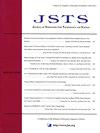Resistive Hydrogen Detection Sensors based on 2 Dimensions – Molybdenum Disulfide Decorated by Palladium Nanoparticles
IF 0.8
4区 工程技术
Q4 ENGINEERING, ELECTRICAL & ELECTRONIC
Journal of Semiconductor Technology and Science
Pub Date : 2023-10-31
DOI:10.5573/jsts.2023.23.5.258
引用次数: 0
Abstract
This research presents a resistive-type hydrogen (HSUB2/SUB) gas sensor based on a composite of palladium nanoparticles (Pd-NP) decorated on 2Dmolybdenum disulfide (MoS2) layer. The sensor fabrication involves synthesizing MoSSUB2/SUB and coating Pd by DC sputtering technique. MoS2 has been adopted for its high selectivity for H2, wide operating temperature range, reliability, and low power consumption. Pd has high catalytic properties for HSUB2/SUB and performs a HSUB2/SUB adsorption mechanism through resistance transition. In this study, we propose a Pddecorated MoS2 structure and introduce the chemical resistance mechanism within the channel. The limit of detection (LOD), sensitivity and response time of the fabricated HSUB2/SUB gas sensors are optimized and analyzed. Finally, the nanocomposites network based HSUB2/SUB sensor can promote the utilization of various industries and discuss the issues in sensor applications.基于二维钯纳米粒子修饰二硫化钼的电阻式氢探测传感器
提出了一种基于二硫化钼(MoS2)表面修饰钯纳米粒子(Pd-NP)复合材料的阻式氢(HSUB2/SUB)气体传感器。传感器的制作包括合成MoSSUB2/SUB和用直流溅射技术涂覆Pd。MoS2因其对H2的选择性高、工作温度范围宽、可靠性高、功耗低而被采用。Pd对HSUB2/SUB具有较高的催化性能,并通过抗性转变实现HSUB2/SUB的吸附机制。在这项研究中,我们提出了一种pd2修饰的MoS2结构,并介绍了通道内的耐化学性机制。对制备的HSUB2/SUB气体传感器的检测限(LOD)、灵敏度和响应时间进行了优化分析。最后,基于纳米复合材料网络的HSUB2/SUB传感器可以促进各行业的应用,并讨论传感器应用中的问题。
本文章由计算机程序翻译,如有差异,请以英文原文为准。
求助全文
约1分钟内获得全文
求助全文
来源期刊

Journal of Semiconductor Technology and Science
ENGINEERING, ELECTRICAL & ELECTRONIC-PHYSICS, APPLIED
CiteScore
0.90
自引率
0.00%
发文量
40
审稿时长
6-12 weeks
期刊介绍:
Journal of Semiconductor Technology and Science is published to provide a forum for R&D people involved in every aspect of the integrated circuit technology, i.e., VLSI fabrication process technology, VLSI device technology, VLSI circuit design and other novel applications of this mass production technology. When IC was invented, these people worked together in one place. However, as the field of IC expanded, our individual knowledge became narrower, creating different branches in the technical society, which has made it more difficult to communicate as a whole. The fisherman, however, always knows that he can capture more fish at the border where warm and cold-water meet. Thus, we decided to go backwards gathering people involved in all VLSI technology in one place.
 求助内容:
求助内容: 应助结果提醒方式:
应助结果提醒方式:


